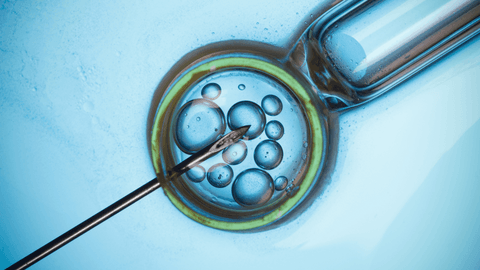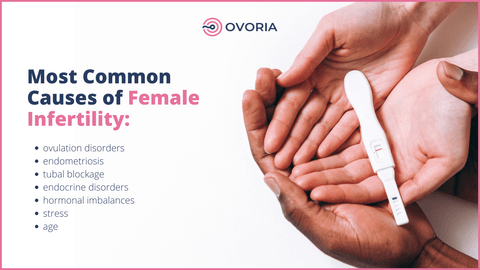Female Infertility and IVF
In Vitro fertilization, sometimes known as IVF, is a treatment that helps people who want to have a child. Nowadays, female infertility has grown to be a severe disease, affecting young generations significantly. About 27-30 million couples are facing this issue each year, with 30% being attributed to female fertility issues or infertility that can be resolved by IVF treatment proven effective so far.

What is Female Infertility?
Female infertility is the inability of a woman to conceive pregnancy for at least a year with no results due to some factors like ovulation disorders, endometriosis or tubal blockage. Unfortunately, today this problem affects a large number of people. But thanks to the development in assisted reproductive technology, there are few treatments for women who are struggling with infertility problems.
There are various types of female infertility:
- Primary infertility: it is the inability to conceive after unprotected sex for 12 months or more
- Secondary infertility: it is an incapability to conceive or carry a healthy pregnancy to live after previously giving birth. It usually refers to couples who were trying to conceive for six months to one year. It can be caused by different conditions such as endometriosis, polycystic ovary syndrome, problems with the uterus, problems with fallopian tubes, age.
- Sterility: it is the inability of conceiving as a result of such procedures as hysterectomy, tubal ligation or vasectomy.
- Asexuality: because of consistent miscarriages woman can not conceive and accept fact that she cannot be a mother.
- Unexplainable infertility:
it is the most common type of infertility women could face. It's responsible for around 30% of infertility cases. Even after primary infertility medical tests are carried out, the source of infertility remains a secret.
Female Infertility Symptoms
Female infertility refers to the inability to achieve pregnancy, which can also be an indication of an irregular menstrual cycle that is either too long (>35 days) or too short (< 21 days), or no menstrual cycle.
Symptoms of infertility in women:
- Inability to achieve pregnancy after having regular sex for more than a year
- Absence of periods
- Painful periods
- Consistent miscarriages
- Imbalance of hormones

What are the Most Common Causes of Female Infertility?
There are various causes of a woman being infertile. Some common reasons are:
- Ovulation Disorders: one of the top female infertility causes is an ovulation disorder. Approximately 15% of Infertile women suffer from ovulation disorders, which prevent the release f eggs, making it impossible for couples to conceive.
- Endocrine Disorders: the female body produces estrogen, progesterone, and other hormones that make a woman's reproductive system develop and create an egg every month. A disorder in the endocrine system (which includes the ovaries and the thyroid gland) causes infertility.
- Endometriosis: one-third of the women with endometriosis experience infertility - it's a condition in which the endometrial lining grows outside the uterus, damaging pelvic organs and affecting a woman's ability to conceive.
- Tubal Blockage: Some of the causes of female infertility are blocked fallopian tubes, where the ova is prevented from reaching and fertilized by spermatozoa and abnormalities in it.
- Age: according to Columbia University's FertilityDoctor.com, women are most fertile in their 20's, and after 35, their fertility starts declining, both in terms of egg quality and quantity.
- Hormonal Imbalances: irregularities in thyroid hormone or PCOS due to hormonal imbalances are amongst the leading cause of infertility in women. These imbalances decrease the regularity of ovulation and prevent a woman conceive.
- Stress: according to researchers, women with high stress levels have a more challenging time conceiving, which causes imbalances in the hormone necessary for regular ovulation.
- Style of living: certain lifestyle factors can affect a woman's menstrual cycle. This causes weight fluctuations and impacts her fertility.
- Other disorders: some women have diseases that reduce their fertility. Such conditions include uterine fibroids, polyps, autoimmune disorders, pelvic inflammatory diseases, and tubal infections.
- Cervical Factor: causes such as uterine or cervical cancer can interfere with the implantation or increase the likelihood of a miscarriage. Sometimes the cervix cannot produce mucus required by sperm to enter the uterus, preventing the conception of pregnancy.
How is Female Infertility Diagnosed?
Doctors can help to diagnose infertility by taking a detailed history, performing a physical exam, and ordering laboratory tests. A thorough evaluation of the patient is paramount for determining an accurate diagnosis and treatment plan. Some fertility diagnostic procedures include ovulation testing, ultrasound examination, or hysterosalpingography (HSG).
Female Infertility Treatments
If a woman has infertility, she can be treated using any of the following methods:
- In Vitro Fertilisation (IVF): this treatment involves the fertilization of eggs and sperm, embryo development, embryo transfer, and assists its implantation. It's an advanced treatment that has a good record for safety and success.
- IVF with Donor Eggs: a process where an embryo is implanted inside a female's uterus. The embryos are developed from eggs that a donor nicks.
- Laparoscopy: a procedure that diagnoses and treats infertility in women. It can also treat endometriosis because of its ability to remove scar tissue in the pelvis.
- IUI with Controlled Ovarian Stimulation: certain women may have difficulties with IUI because too few eggs are released during stimulation or because the sperm may not get to the uterus and fertilize the egg.
Any female infertility treatment's success rate depends on the reasons behind infertility, age, and the type of technology used while treating.
References:

